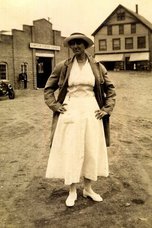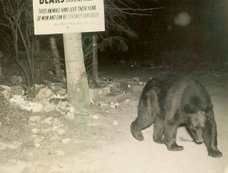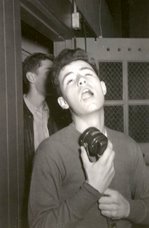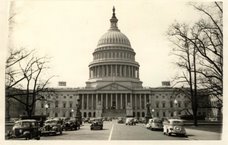Across the country, scores of World War II servicemen, their wives, and the nurses who tended the troops are dwindling daily. Any newspaper in Any Town, U.S.A. lists the obituaries of the men and women whose commitment to duty made all the difference in a grueling era of deprivation and fear.
Yet there are still precious souls among us who, upon casual conversation, can be persuaded to take us back in time -- their time at war, to their lives interrupted.
It's interesting to hear the rationale for which service branch was selected. "Well, I knew I could use my mechanical engineering and machinery talents on a naval ship and frankly, I didn't think I would be much use with a gun. At 6' 4" I just figured I would be a splendid target, that's all," and the like explain why Earl entered the Navy instead of the Army as many of his New Jersey friends and neighbors did.
A couple of those Jersey fellows were Earl's high school buddies and before the war they practiced an extracurricular skill as a team -- acrobatic leveling or balancing. At one time (the now near-90 year old man was regaling me with stories encompassing the heart of a century), Earl was on his way to becoming a professional leveler. I never knew this term. But when Earl explained it to me, I could imagine how the performers who climbed higher and higher on top of him needed to count on the steady stance of the underpinning form of their colleague -- Earl. Earl, the human leveler.
As he talked, Earl's eyes twinkled remembering those days and I could almost see in my mind's eye the shapes of bodies climbing higher and higher to the sounds of awes from the audience. I felt goosebumps.
For a time it surely seemed that Earl and his band of brothers were headed for the professional performing circle. Favorable auditions were granted and they felt at age 18 the world was just beginning for them.
And then the U.S. entered WWII and the performance artists placed their skills in the hands of their country instead.
Earl and I talked about the twists and turns in one's life, how doors open and close without our awareness that sometimes they are altering our lives forever. That he would, post-war, meet a gal, Margie, in his college town, who shared his old love of acrobatics, herself using a trapeze at times, seemed almost too good to be true. Their love was immediate and he was overjoyed to discover that he could level her just like he had leveled the fellows a few years before. And so life was good for them.
As we talked over old times and how he came to become an engineer in Silicon Valley instead of the circus performer traveling on-the-road, lovely Margie walked over grinning to ask him a simple question. "What's the name of our road?"
Earl answered her gently and she happily walked back to her friends. His eyes weren't twinkling as before when he told me that Margie now has Alzheimer's Disease. But they still danced the night away at the holiday party with other retirees who returned to celebrate the occasion with fellow workers. We were grateful Earl and Margie were there.
And I was so thankful that he shared this and other vignettes of the lives of the WWII generation at a time when I'm communicating with soldiers in Iraq and some are struggling to adjust to life after Iraq. There's never a comparison between wars, eras, nor people of course.
I am reminded that real courage is born of those who serve. And those who keep a level head while continuing to 'Level' their beloved through the storms and trials of disease are heroes indeed, because their course too, like soldiers, is uncharted, yet steadfast.
skip to main |
skip to sidebar
"Save me from the lion's mouth: for thou hast heard me from the Horns of the Unicorns." (Psalm 22:21) Commentary, complaints, woes, and wonders about Life, the human condition, grubberment, 'popped' culture, and the Planet Girth.



